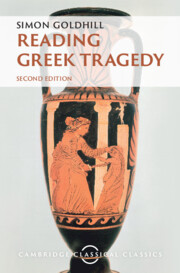Book contents
- Reading Greek Tragedy
- Cambridge Classical Classics
- Reading Greek Tragedy
- Copyright page
- Dedication
- Epigraph
- Contents
- Preface
- Preface to Second Printing
- Re-Reading Reading Greek Tragedy
- Chapter 1 The Drama of Logos
- Chapter 2 The Language of Appropriation
- Chapter 3 The City of Words
- Chapter 4 Relations and Relationships
- Chapter 5 Sexuality and Difference
- Chapter 6 Text and Tradition
- Chapter 7 Mind and Madness
- Chapter 8 Blindness and Insight
- Chapter 9 Sophistry, Philosophy, Rhetoric
- Chapter 10 Genre and Transgression
- Chapter 11 Performance and Performability
- Bibliography
- Index
Chapter 4 - Relations and Relationships
Published online by Cambridge University Press: 19 October 2023
- Reading Greek Tragedy
- Cambridge Classical Classics
- Reading Greek Tragedy
- Copyright page
- Dedication
- Epigraph
- Contents
- Preface
- Preface to Second Printing
- Re-Reading Reading Greek Tragedy
- Chapter 1 The Drama of Logos
- Chapter 2 The Language of Appropriation
- Chapter 3 The City of Words
- Chapter 4 Relations and Relationships
- Chapter 5 Sexuality and Difference
- Chapter 6 Text and Tradition
- Chapter 7 Mind and Madness
- Chapter 8 Blindness and Insight
- Chapter 9 Sophistry, Philosophy, Rhetoric
- Chapter 10 Genre and Transgression
- Chapter 11 Performance and Performability
- Bibliography
- Index
Summary
In the last two chapters I have considered first how a series of terms concerned with civic order and relations within the city is placed at risk in the tragic arena, and secondly, in more general terms, how the city itself constitutes a specific ideology as well as a specific social organization. Now in this chapter I am going to investigate a particularly important system of ideas concerned with relations between people in the city and family, a system which is especially difficult for the modern reader to determine, namely, the notions constituting and surrounding the adjectives philos and ekhthros. I have left these terms untranslated as yet because part of the problem for the modern reader is the extensive semantic range of these and related terms, not just in the way that words in different languages are rarely coextensive in connotation, but also in the way that the force and direction of usage in this case are so varied. In much the same manner as one can say in English ‘Shoshana loves ice-cream’ and ‘Juliet loves Romeo’ to imply with the same word quite a different force and direction of emotion, so philos is a common term of address between the characters of a Platonic dialogue, where it is often translated ‘my dear fellow’ and the like, but at the same time philos is also used in the Oresteia to indicate the emotional relationship between Clytemnestra and her adulterer, Aegisthus, which Orestes despises and puts as a cause of her necessary death when he cries ‘Die then, and sleep beside him, since he is the man you love (philein) | and he whom you should have loved (philein) got only your hate’ (Cho. 906–7).
- Type
- Chapter
- Information
- Reading Greek Tragedy , pp. 117 - 146Publisher: Cambridge University PressPrint publication year: 2023

